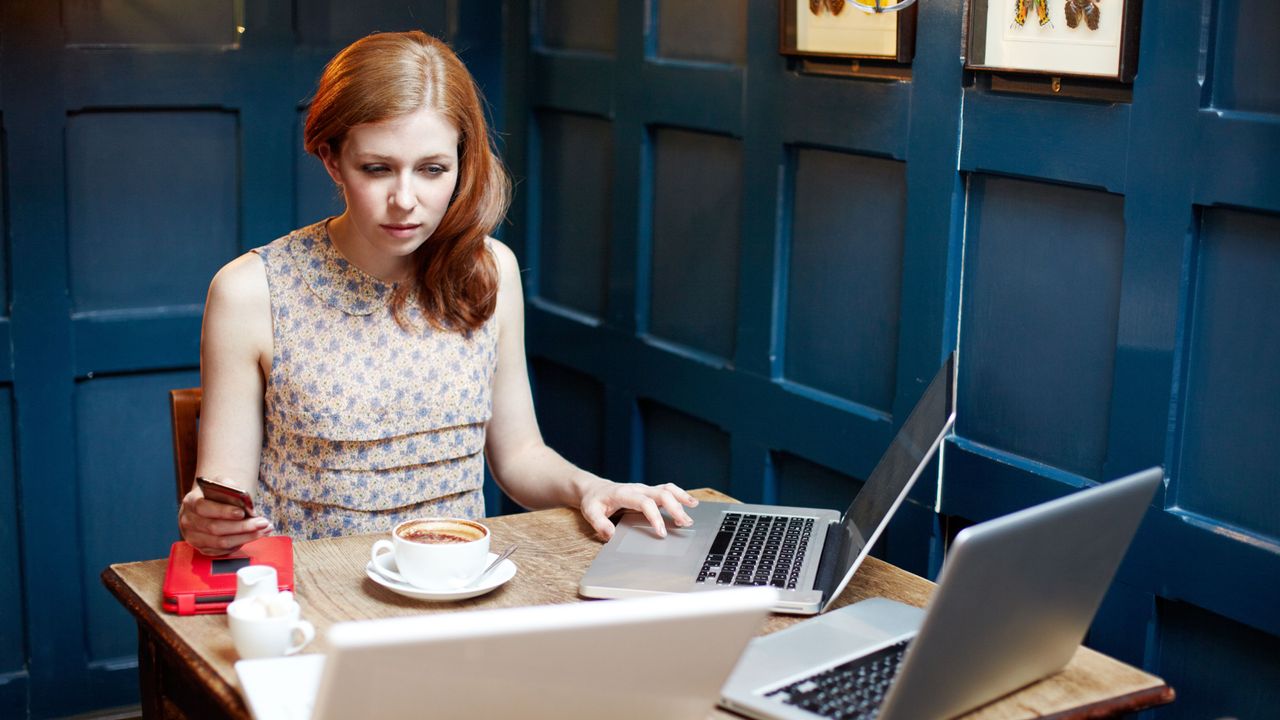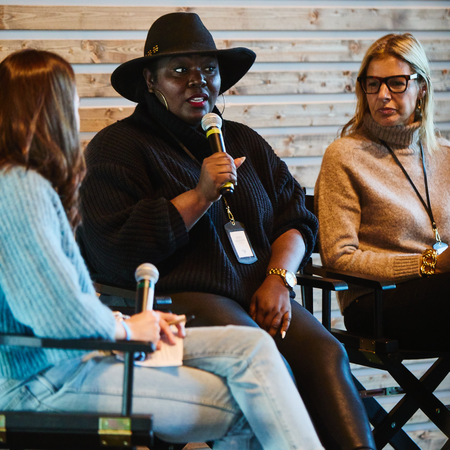Is Doing It All the New "Having It All"? A Look at the Changing Face of Women's Careers
Increasingly, women are trading the traditional 9-to-5 for a career that combines consulting gigs, freelance jobs, and budding startups—often all at the same time.


In college, Rachel Rudwall dreamed of being a diplomat. She liked the idea of hopping from post to post all over the globe, but sitting behind a desk? Not so much. An internship hosting and producing podcasts for a youth-oriented travel agency changed her course. "They sent me—a college kid—to 15 countries over a three-month summer internship," says Rudwall, 29. After graduation, she ended up at Original Productions in Los Angeles, maker of shows like Ice Road Truckers and Deadliest Catch. She worked out of the L.A. office for a year and then went freelance—for National Geographic Channel's Alaska Wing Men, the Discovery series Weed Country, A&E's Storage Wars: New York…the list goes on. She'd dig down for three months, say, in Alaska, working insane hours, and then bank the money.
In her free time and during vacations, she worked on her goal: going from behind-the-scenes to on-camera. Now, five years later, she's still doing this back-and-forth dance. She develops projects (sometimes unpaid) where she's the host—whether it means flying to East Africa to shoot a video for a nonprofit, or to Thailand for an educational series. Also in the mix: a gig as a brand ambassador and blogger for Athleta, a women's fitness apparel brand. She's installed editing equipment for her freelance projects in her house. And she launched a digital travel series, How 2 Travelers (now with more than 130,000 followers), in 2013. "If I'm working on someone else's show six days a week, I'm working on my show on the seventh," Rudwall explains. "When it feels like too much to handle, I think about how I'm more free to create my path and pursue what really matters to me. Then I realize it's exactly where I want to be."
Rudwall isn't alone in relishing this sort of control, despite the accompanying cascade of scheduling, organizing, and irregular paydays. Sure, you give up the job security (such as it is) and benefits, 401(k), etc., that come with a steady gig. [pullquote align='C']But in order to "have it all," many women are being their own bosses and creating their own careers.[/pullquote]But in order to, ahem, "have it all," many women are finding that the best way to approach this status is to be their own bosses and create their own careers. According to a Families and Work Institute report, nearly 80 percent of all workers say they want more flexibility at work. But at the same time, almost 40 percent believe they would be less likely to advance in their careers if they took advantage of such a schedule. Women who want to travel, enjoy family time, or pursue a variety of meaningful work are realizing that to accomplish all of their dreams, they need to take charge of their own trajectory.
Alexis Grant thought she'd be on staff at a newspaper or magazine forever. Public service journalism was her calling. Grant, 33, who has a master's in journalism, had been a full-timer at the Houston Chronicle. She left there to backpack in West Africa and blog about traveling solo as a woman. Then, with some self-taught social media skills, she grew the blog and, in 2010, wrote an e-book on how to build a social media business. A friend asked Grant, who was by then full-time at U.S. News & World Report and living in Arlington, Virginia, for online help drumming up clients for his business. She did such a good job, he suggested she "should really do this for a living." His boss became her client, and that side hustle—helping people build their brands and customer bases through social media and blogging—became so successful, she quit her job.
That was three years ago, and now Grant has eight contractors working for her content-marketing company, Socialexis. She writes e-books (five in four years) and mentors people on the side (via clarity.fm, donating those fees to charity). She probably logs more hours than she did working full-time for someone else, but feels more satisfied. "I have autonomy over my work and my schedule," she says. "I can choose whom I work with and what type of work I do. To me, that feels really empowering." She can visit Tanzania or Australia for weeks without asking for permission, and because she's not shackled to a traditional office, she sees her family more. Freelancing is also better for her health, she says, because she makes time for Spin class or yoga every day—hard to do in the old-school 9-to-5 (or 8-to-6:30-or-7) schedule.
For Rudwall and Grant, and scores of other women like them, the solution has been to create an à la carte work schedule that includes starting a company, consulting, or freelancing—or all of the above. [pullquote align='C']According to a 2014 study from Freelancers Union, 34 percent of American workers are freelancing.[/pullquote]According to a 2014 study from Freelancers Union, 34 percent of American workers are freelancing (18 percent of those—9.3 million people—as "diversified workers," with multiple sources of income). Within those stats, the numbers tip toward women. A 2012 survey involving some 1,500 freelancers found that 71 percent were women. And the number of women-owned businesses grew at one and a half times the national average between 1997 and 2014, and shows no sign of abating. Attitudes toward business-as-usual employment are changing: A whopping 70 percent of college-educated workers born in or after 1983 said they might reject traditionally organized jobs in favor of working independently, according to a 2013 survey conducted by the consulting firm Deloitte.
It's no wonder women are so ready to jump off the corporate ladder, after witnessing what happened during the Great Recession. From December 2007 to June 2009, more than 2 million women lost their jobs, and were slow to find new employment in the next few years (men have bounced back more quickly in 15 out of 16 job sectors, according to a Pew Research Center report). Young women may be wary of giving their all to corporations only to get laid off when times get tough. The logical next step is to make up a career in order to thrive.
Stay In The Know
Get exclusive access to fashion and beauty trends, hot-off-the-press celebrity news, and more.
Nathalie Jordi, 32, says she actually enjoyed her regular, set-schedule jobs—including stints at a cheese shop in London and a cooking school in Ireland. But, as she got older, she wanted to set her own agenda and felt that she worked harder and reaped bigger rewards serving as her own boss. In 2008, on a whim (she was working as a freelance food writer), she and two partners started People's Pops, a Brooklyn-based ice-pop company. They whipped up treats from locally grown fruit and—riding the artisanal trend—sold out immediately at a food market. That led to a stand at the hipster Brooklyn Flea market, which led to a stall at Manhattan culinary hot spot Chelsea Market. Now there are wholesale and catering businesses, and four NYC locations.
Jordi's boyfriend (now husband) was in New Orleans. So she applied to Tulane's business school there and got her MBA—even after having succeeded at her startup with zero entrepreneurial experience. At the same time, she was falling in love with her new city. So, along with holding a small stake in People's Pops, Jordi currently is working with a business partner, hoping to open a boutique hotel. As a DIY apprenticeship, she's taken jobs in key positions at a local hotel (front desk, reservations). She also had a gig as a researcher for the Wildsam Field Guide to New Orleans, a travel book. All these pieces of the puzzle fit for Jordi. "There's no division between my work and my life, and I'm OK with that. I don't separate them," she says.
The customized career isn't for everyone. One downside is that you're never really off the clock, as Rudwall also admits. But she likes having a modicum of flexibility that she wouldn't have in a typical office. "When I'm doing passion projects, I'm editing at home, and I can actually see my partner when he gets there," Rudwall says.
Instability is the flip side of freedom from the corporate yoke. A self-determined career can be brilliantly fluid or cobbled-together, marked by cycles of financial feast or famine. Grant's solution was to not quit her day job until her business was booming.
Rudwall says she's only able to make her hustle work because her TV-producing jobs pay well. Those, in turn, fund the projects she loves to do. "I'll work on a project that gives me the financial freedom to take a risk for a few weeks or months. I won't have money coming in right away, so that's a financial risk. But that's the ebb and flow. I use that cushion to pursue what I want," she says. Having a skill that you can go back to during periods when money is tight is important to making the hustle work.
Forging your own way is not easy. It's anxiety-making and exhilarating. It's rewarding and uncertain, fast-paced and "hurry up and wait." Still, Rudwall says she actually finds this give-and-take useful. "You're always tearing at yourself to make something exist that doesn't exist yet," she explains, and that takes a lot of motivation. But, as Rudwall puts it, "It's more valuable to take the big risk for something that really matters than to feel calm in someone else's office."
This article appears in the January 2015 issue of Marie Claire.
Related Links:
Glassdoor's 2015 List of Best Places to Work May Seriously Surprise You
-
 Kim Cattrall’s Secret to a Refreshed Morning Gives Her Goosebumps
Kim Cattrall’s Secret to a Refreshed Morning Gives Her GoosebumpsIt's "invigorating."
By Samantha Holender Published
-
 Acne Doesn’t Stand a Chance Against My (Somewhat Chaotic) Morning Routine
Acne Doesn’t Stand a Chance Against My (Somewhat Chaotic) Morning RoutineKeep the texture and irritation at bay with these editor-vetted items.
By Ariel Baker Published
-
 Hailey Bieber’s Just as Obsessed With This ‘90s Hair Accessory As the Rest of Us
Hailey Bieber’s Just as Obsessed With This ‘90s Hair Accessory As the Rest of UsThe new mom was spotted in this Fashion Week-approved trend while running errands.
By Ariel Baker Published
-
 Peloton’s Selena Samuela on Turning Tragedy Into Strength
Peloton’s Selena Samuela on Turning Tragedy Into StrengthBefore becoming a powerhouse cycling instructor, Selena Samuela was an immigrant trying to adjust to new environments and new versions of herself.
By Emily Tisch Sussman Published
-
 This Mutual Fund Firm Is Helping to Create a More Sustainable Future
This Mutual Fund Firm Is Helping to Create a More Sustainable FutureAmy Domini and her firm, Domini Impact Investments LLC, are inspiring a greater and greener world—one investor at a time.
By Sponsored Published
-
 Power Players Build on Success
Power Players Build on Success"The New Normal" left some brands stronger than ever. We asked then what lies ahead.
By Maria Ricapito Published
-
 Don't Stress! You Can Get in Good Shape Money-wise
Don't Stress! You Can Get in Good Shape Money-wiseFeatures Yes, maybe you eat paleo and have mastered crow pose, but do you practice financial wellness?
By Sallie Krawcheck Published
-
 The Book Club Revolution
The Book Club RevolutionLots of women are voracious readers. Other women are capitalizing on that.
By Lily Herman Published
-
 The Future of Women and Work
The Future of Women and WorkThe pandemic has completely upended how we do our jobs. This is Marie Claire's guide to navigating your career in a COVID-19 world.
By Megan DiTrolio Published
-
 Black-Owned Coworking Spaces Are Providing a Safe Haven for POC
Black-Owned Coworking Spaces Are Providing a Safe Haven for POCFor people of color, many of whom prefer to WFH, inclusive coworking spaces don't just offer a place to work—they cultivate community.
By Megan DiTrolio Published
-
 Where Did All My Work Friends Go?
Where Did All My Work Friends Go?The pandemic has forced our work friendships to evolve. Will they ever be the same?
By Rachel Epstein Published
